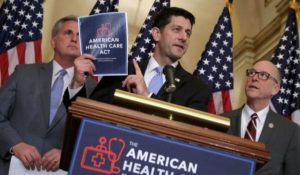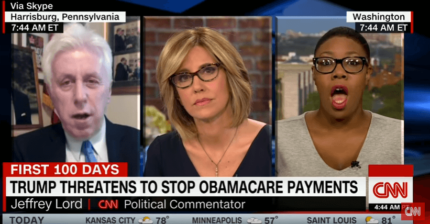
Critics fear that the provisions laid out in the American Health Care Act will leave millions of Americans without health coverage. Photo by Chip Somodevilla, Getty Images.
House Republicans’ recently unveiled health care plan to repeal and replace former President Barack Obama’s landmark health policy cleared its first two hurdles Thursday, March 9.
After debates between Democrats and the GOP had dragged on for nearly 18 hours, the House and Ways Committee finally voted to approve new American Health Care Act. Meanwhile, the House Energy and Commerce Committee required a grueling 27 hours and 18 minutes to cast their votes in favor of the bill, according to CNN.
The committee’s approval of the AHCA — or “Trumpcare” — is a small victory for President Donald Trump and Republicans, who hope to fast-track the bill through Congress. Though the GOP is pushing hard to get the plan passed as soon as possible, Democrats are pulling out all stops to ensure that doesn’t happen.
The president and GOP members are trying desperately to keep “Trumpcare” — a play on “failing” Obamacare — from sticking, but to little effect. Many news outlets have already adopted the moniker and are running with it.
During the debates, which carried on into the wee hours of Thursday morning, Republicans bypassed questions about how much their health care plan would cost and scoffed at claims that it would ultimately leave millions of Americans without coverage, CNN reported. Dems pushed back by launching diversionary attacks against President Trump, calling out the fact that he still hasn’t released his tax returns.
Critics on both sides of the aisle have taken aim at Trumpcare, with liberals calling it a ploy to strip over 15 million Americans of their health coverage and conservatives arguing that the bill still largely resembles Obamacare. Key medical organizations that backed the Affordable Care Act also have come out of the woodwork to contest the proposed plan, asserting that it would hurt the most vulnerable Americans.
The American Medical Association, the nation’s largest physicians organization representing more than 220,000 doctors, residents and medical students, was the latest to speak out against the new measures laid out in the AHCA, including cuts to major public health and preventative health funds.
“While we agree that there are problems with [Obamacare] that must be addressed, we cannot support the AHCA as drafted because of the expected decline in health insurance coverage and the potential harm it would cause to vulnerable patient populations,” AMA CEO Dr. James Madara wrote in a letter to Congressional leaders.
The AMA’s opposition to the bill was followed by action from both the American Hospital Association and AARP, the nation’s largest seniors organization, on Tuesday, March 7, Fortune reported.
AARP senior vice president Joyce Rogers penned a letter to Congress arguing that, “This bill would weaken Medicare’s fiscal sustainability, dramatically increase health care costs for Americans aged 50-64 and put at risk the health care of millions of children and adults with disabilities. and poor seniors who depend on the Medicaid program for long-term services and supports and other benefits.”
Rogers also expressed concern that the plan’s changes to current tax payments could hike premium costs for the average 55-year-old making just $25,000 per year by over $2,300. The AHCA’s plan to phase out Medicaid expansion also has caused widespread panic among those who rely on it for health coverage.
“[I]t appears that the effort to restructure the Medicaid program will have the effect of making significant reductions in a program that provides services to our most vulnerable populations, and already pays providers significantly less than the cost of providing care,” wrote AHA president and CEO Richard Pollack. “My group cannot support the American Health Care Act in its current form.”
Press Secretary Sean Spicer seemingly shrugged off mounting opposition from the medical community, saying that while the GOP would love to have every group on board with their plan, the ultimate goal is to make sure that “patients get the best deal.”
A number of House committees are expected to begin debating the bill throughout the week as Democrats and Republicans fight to make sweeping changes to the plan.


